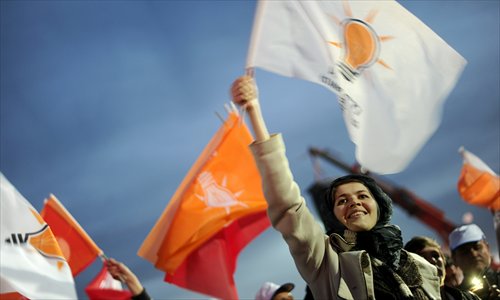Turkey goes to polls

A Justice and Development Party supporter waves an AKP flag during a rally in Istanbul on Sunday. Prime Minister Recep Tayyip Erdogan rallied hundreds of thousands of supporters on Sunday, dismissing accusations of intolerance by Western and domestic critics. "I don't care who it is. I'm not listening," he said to cheers. Photo: AFP
Turkey Prime Minister Recep Tayyip Erdogan heads to Sunday's local elections hopeful of prolonging his 13 years in power, despite ongoing domestic unrest and the lingering controversy from a recent corruption scandal.
The municipal local elections in the capital and other major cities are the first time that Turks will have gone to the ballot box since the battles between police and protesters in June. The eight lives lost in that crackdown have fueled political upheaval ever since.
Erdogan's reaction to his critics, branding them "terrorists," has caused further divisions between his government and the voting public.
"We will teach them a big lesson on March 30 ... and claim victory," Erdogan, 60, screamed to a crowd of his supporters at a mass rally in Istanbul last week, one of dozens of events he has attended on the election trail.
The prime minister's office has moved to declare the leaked YouTube recording - where Erdogan is alleged to have discussed the concealment of large sums with his son on the telephone - a fake.
Erdogan has stated that he may ban YouTube and Facebook, where many posts have exposed the corruption that currently mires the government.
In his latest attempt to control social media in Turkey, Erdogan has banned Twitter earlier this week. The opposition had earlier posted audio recordings on the social media site, which alleged Erdogan was involved in a corruption scandal.
But according to local media reports, the Ankara administrative court on Wednesday overturned the government's controversial Twitter ban and was set to inform the telecommunications regulator of the decision.
Erdogan's ban on the social media site caused outrage within Turkey and around the world, becoming another millstone for the prime minister and his Islamic-rooted Justice and Development Party (AKP) ahead of Sunday's election.
Civil unrest
Aside from the lingering controversy from the corruption scandal and Twitter ban, domestic unrest continues in Turkey.
Violence across the country greeted the funeral of Berkin Elvan on March 11. The 15-year-old died after nine months in a coma after being struck in the head by a tear gas canister while shopping for bread during the street protests against Erdogan in June.
The new unrest adds yet more pressure on the government and Erdogan has acknowledged that the local elections will essentially act as a referendum on his rule.
Li Shaoxian, a research fellow with the China Institutes of Contemporary International Relations, told the Global Times that aside from the earlier cabinet reshuffle and the scandal of the leaked telephone recording, the core issue of the unrest is the continuous political conflict.
After three of his ministers resigned in the aftermath of the alleged corruption scandal, Erdogan reshuffled his cabinet.
"One of the main causes of the unrest in Turkey is the power conflict between Erdogan and [outspoken critic and Muslim leader] Gulen, who has a strong impact on Turkish politics. After going abroad in the 1990s, Gulen has controlled his support base remotely, which has formed a net around Erdogan," Li said.
Fethullah Gulen, a Turkish preacher, scholar and Islamic opinion leader, who is currently in Pennsylvania, US, is the founder of the Gulen Movement, which has a strong following in Turkey and Central Asia.
Yin Gang, a research fellow with the Chinese Academy of Social Sciences Institute of West-Asian and African Studies, shared a similar view with Li, saying the essential reason for political unrest in Turkey is that policies implemented by Erdogan provoked furious dissatisfaction from the supporters of the Gulen Movement.
"The situation in Turkey has arisen because the opposition is dissatisfied with the strong political stand of Erdogan and the corruption scandals of the government," Yin said.
Election challenge
Erdogan has said that he is ready to relinquish power if his AKP loses the March 30 elections, according to an AFP report on March 5.
However, a recent Reuters report suggests that the prime minister and his ruling party will still be in power based on pre-election polling.
"It is quite difficult to destabilize the ruling position of Erdogan, even with forces associated with Gulen opposing the regime," Li said. "The oppositional force is still relatively weak compared to the government and no force can replace Erdogan's ruling position."
"Erdogan has his own methods in managing the impact from the oppositional force on his regime, which is shown in the reshuffling of his cabinet and removing corrupt police from office," he said.
When talking about the reason for Erdogan's dominance in the poll, Li said it was closely connected with the economic growth under Erdogan's rule since 2002.
"Turkey has made extraordinary progress in the economic field over the last 10 years, especially during an era when the world economy is experiencing depression. Erdogan should be given credit for those achievements."
However, Yin said that the current unrest and corruption scandal will overshadow Erdogan's regime and the result of the election to some extent.
"Erdogan's corruption is not confirmed yet, but if and when it turns out to be true the situation may bring a great change to the regime."
He said Erdogan's priority was still to "clear his name from the corruption scandal from legal aspect."
"Whether the regime would be 'overthrown' remains unclear," Yin said.
Agencies contributed to this story